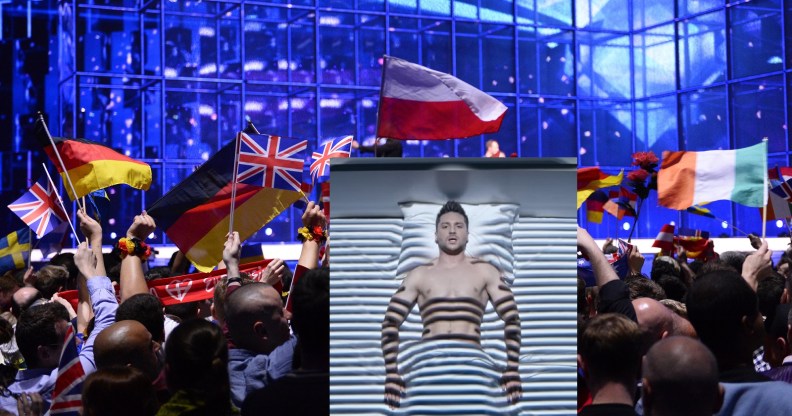Eurovision reverses flag policy after banning ‘political’ waving of rainbow flag

The Eurovision Song Contest has scrapped a controversial policy which banned people from flying the Welsh or Australian Aboriginal flags – and restricted ‘political’ waving of the rainbow flag.
The camp contest is set to take place in Stockholm this week, with Russia’s Sergey Lazarev currently favourite to take the trophy.
But ahead of the first semi-final on Tuesday, the contest’s organisers released a bureaucratic flag policy specifying which flags can and cannot be flown by fans in the Globen Arena.
The policy limits flags to the flags of participating members and other UN states, along with the EU flag and rainbow flag – but warns fans not to use pride flags as a “political tool”.
A Eurovision spokesperson had confirmed to PinkNews that the restriction could prevent fans from flying rainbow flags during Russia’s entry, for instance – and also confirmed regional flags would be banned entirely.
However, the organisers have since reversed their position – opting to allow regional flags after realising some of the entrants themselves were from areas with ‘banned’ flags.
A statement said: “After reflection and constructive talks with several participating delegations, Eurovision Song Contest organisers have agreed to relax the flag policy, and to allow national, regional and local flags of the participants e.g. the Welsh flag (as one of the UK singers is from Wales) and the Sami flag (as the Norwegian singer is originally of Sami heritage).
“This is in addition to the flags of all UN member states, the EU flag and the rainbow flag, as stipulated in the original guidelines.
“The EBU also proposed a more tolerant approach to other flags as long as the audience respects the non-political nature of the Eurovision Song Contest and do not deliberately attempt to obstruct the camera views.
“This proposal was approved by the Eurovision Song Contest’s governing body, the Reference Group.”
In the past the contest organisers have repeatedly attempted to smooth over Russia’s tumultuous relationship with the contest’s large gay following – deploying ‘anti-booing’ tech last year to minimise repeated heckling of the Russian entry.
A previous statement said: “The EBU aims to assure that the Eurovision Song Contest is free from political statements, unauthorised commercial messages and offensive comments, in line with the contest’s Rules that all 42 participating broadcasters agreed upon.
“The organisers are fully committed the safety of the audience and crew. For these purposes, the Reference Group of the Eurovision Song Contest, which is the contest’s governing body on behalf of the participating broadcasters, decided on a flag policy.
“Regarding the rainbow flag, that technically represents diversity which is a core value of the EBU.”
Earlier this year, organisers announced a drastic shake-up to voting and results system.
The new system cuts down on the roles of the ‘national spokespeople’ – who will now just briefly announce the winner of their jury vote, rather than read out a list of scores..

